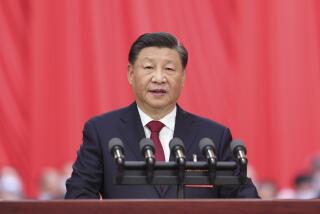China Labor System Is a Brake on Growth
- Share via
The People’s Republic of China has been fairly successful in recent years in attracting foreign investors, especially American multinationals. The steady if not rapid growth in foreign investment is attributable to the open-door policy launched by Beijing in the late 1970s. But there are troubling signs that China’s labor system, more reminiscent of medieval times than the 20th Century, may impede or even threaten this progress.
Chinese leaders see foreign investment as an important ingredient of economic reform and as a means to acquire the much-needed capital, technology and management skills to help the country modernize. Despite the progress, foreign investors still encounter formidable obstacles in doing business in China, which remains essentially a non-market economy. One problem unique to China is the difficulty in hiring local white-collar workers, which has grown increasingly acute because the demand for professionals increases as the volume of foreign investment rises.
A recent article in the People’s Daily, the official Chinese newspaper, described American Motors Corp.’s experience in trying to recruit local professionals. When the joint venture commenced operation in 1984, it advertised for professionals such as engineers and technicians. It selected 100 people from 800 applicants. However, most of the units (every institution, such as a company, school or government agency, is called a unit) at which the 100 were employed refused to release them, in spite of pressure from the central government.
By the end of February, 1988, more than three years later, these positions were still unfilled. Many similar examples could be cited. Last year, 19 foreign firms in Beijing offered jobs to 1,300 people; only 206 succeeded in being “transferred.”
The root of the problem lies in China’s labor system. The system, which is under reform, guarantees employment for everyone. High school and university graduates are assigned to work at a unit. A unit operates like a self-contained community, providing social welfare such as medical care, pensions and housing to employees. However, worker mobility between units isdifficult and rare. While units are not free to hire or fire people, neither are employees free to quit. A job change is referred to as a “transfer” (within the state-owned system), which requires the simultaneous consent of the units on both sides of the transfer. Should a person leave the unit without approval, he loses all accumulated welfare benefits. As a result, few people attempt it. Furthermore, the transfer of a personnel file is required whenever one changes jobs. A person without a file loses the legitimacy of being a state employee, and someone who leaves his job without permission is not likely to be given his file.
To say that China’s labor system--which regards people as private property and is similar to feudal serfdom--is economically inefficient is an understatement. Some units are over staffed with highly trained professionals who spend idle hours at work, while other units cannot fill their positions. Some units hold onto employees deemed indispensable. Most, however, simply like to exercise power over their “property.”
Many bureaucrats resent those who want to work for a foreign firm, which almost certainly offers better pay. Jealousy and prejudice against the educated remain deeply rooted among many bureaucrats, a lingering legacy of the tragic Cultural Revolution. According to the report in the People’s Daily, some unit leaders decided to approve transfers to anywhere but a foreign enterprise. This attitude, surprisingly, is representative of many in power at the unit level in defiance of official government policy.
Even if a foreign firm successfully recruits a person, the person has a dual status thrust upon him. He becomes an employee primarily of the state agency Foreign Enterprise Services Corp. and secondarily of the foreign company. As a result, the foreign firm must pay the employee’s salary to the agency, which in turn pays the employee after making a deduction, typically about 90%. The employee’s salary is thus brought to parity with the local wage rate.
The practice certainly does not promote rapid transfer of technology and management skills to China. Many executives have told me that, as a matter of policy, they do not put Chinese in key or sensitive positions, since they are regarded as primarily employees of the Chinese government. The managerial positions are usually filled by expatriates or residents of Hong Kong.
If allowed to continue, China’s labor system will harm both the country and foreign investors. Potential investors will turn away if they cannot take advantage of the abundant labor the country might otherwise offer. In addition, many Chinese professionals will never have the opportunity to put their talent to use. What’s more, the importation of much-needed technology and management skills will not be completed without a generation of trained professionals.
Unless the system is made more responsive, growth in foreign investment in China could be placed in serious jeopardy.
More to Read
Sign up for Essential California
The most important California stories and recommendations in your inbox every morning.
You may occasionally receive promotional content from the Los Angeles Times.










